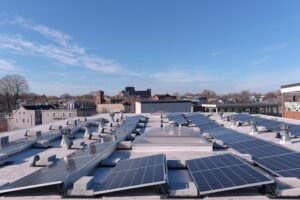Who is a member?
Our members are the local governments of Massachusetts and their elected and appointed leadership.

Cambridge’s Solar Assistance Program supports three ownership models for eligible applicants: outright ownership, a power purchase agreement, or solar hosting. (Photo courtesy Resonant Energy)
The city of Cambridge launched two new sustainability initiatives in April, reaffirming its commitment to sustainability and climate change resilience during Earth Month.
Sustainable Cambridge, a one-stop shop for the city’s climate and sustainability efforts, went live on April 10, and 12 days later, the city announced the Solar Assistance Program, which provides free support to city businesses, nonprofits and large building owners seeking to place solar panels on their buildings.
Susanne Rasmussen, the city’s director of Environmental and Transit Planning, said Sustainable Cambridge came from a “long-term desire on the part of the city in recognition that communicating to our residents and businesses by department was not a really good strategy for letting people know about climate change policies.”
The creation of the Office of Sustainability in July 2024 and the hiring of Chief Sustainability Officer Julie Wormser a few months later made it possible to consolidate Cambridge’s environmental programs, policies and goals under one umbrella. Wormser quickly committed to launching the Sustainable Cambridge project by Earth Day (April 22) of the following year, a goal that city staff met two weeks early.
Sustainable Cambridge’s website highlights available resources and information, including the city’s existing programs, guides for home recycling and energy efficiency, maps of the city’s green spaces, and links to eco-friendly transit and volunteer opportunities. The website also provides an overview of the city departments responsible for sustainability and climate projects.
Rasmussen said Sustainable Cambridge signals that the city is “very committed to sustainability and climate action, regardless of what might be happening in the world around us.”
Brad Pillen, Cambridge’s energy engagement planner, said the first phase of the rollout was to simply generate feedback that can be used to improve the Sustainable Cambridge website. By August, city staff hope to incorporate that feedback.
While the city looks to coalesce existing sustainability information and resources in one place, staff are also looking to expand Cambridge’s solar network through the new Solar Assistance Program, which targets commercial and large residential buildings with roofs that are less than 10 years old and have at least 2,5000 square feet of roof space — enough to generate 25 or more kilowatts of electricity.
In looking at the city’s available energy programs, staff identified a gap in solar availability and options.
“In Cambridge, solar is difficult because it’s a lot easier to install solar if you have a single-family home than if you live in a condo or multi-family home,” Pillen said.
Cambridge partnered with Boston-based solar company Resonant Energy to run the Solar Assistance Program. Eligible applicants provide their latest electric bill and roof age, and Resonant develops a feasibility analysis and proposal outlining ownership options and cash flows. At that point, applicants can proceed with installation through Resonant or another solar company.
Property owners have three solar ownership models to choose from supported by the Solar Assistance program:
• A direct purchase model, where they own the solar system
• A power purchase agreement, which allows the property owner to purchase discounted electricity generated by the panels
• A solar hosting option, which provides lease payments to property owners for hosting solar on their roof, generating discounted electricity for low-income Cambridge customers
Once the project is live, it would be another renewable energy purchasing option through a marketplace such as EnergySage. Pillen said this purchasing option would start with Cambridge residents before potentially opening up to residents of surrounding communities as well.
He said the program “is essentially helping with affordability and lowering energy costs.”
While the Solar Assistance Program does not address the entirety of Cambridge’s buildings, Pillen said that implementing renewable energy in the city is challenging across the board, and identifying any means to reduce that challenge is an advantage.
“There is no silver bullet in addressing the climate and eliminating fossil fuel burning in our cities,” Rasmussen said. “We have to have a whole basketful of different approaches.”